Gaius Julius Caesar: Conquest of Gaul
Gaius Julius Caesar (13 July 100 - 15 March 44 BCE), Roman statesman, general, author, famous for the conquest of Gaul (modern France and Belgium) and his subsequent coup d'état. He changed the Roman republic into a monarchy and laid the foundations of a truly Mediterranean empire.
The Conquest of Gaul (58-54)
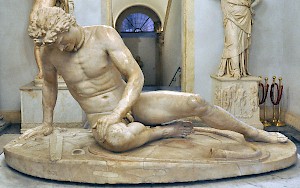
Gaul as a whole consisted of a multitude of states of different ethnic origin. In the late Iron Age, their different cultures had started to resemble each other, largely by processes of trade and exchange. The Greeks and Romans called all these nations Celts or Gauls. In the fourth century, Gallic warriors had settled along the Po and had invaded Central Italy (even capturing Rome in July 387). Most people in Italy were afraid of new Gallic invasions.
In the second century, mass migrations from Germanic tribes had started, for reasons that remain unclear to us. (Climatological changes are sometimes mentioned, but the evidence is contradictory.) Marius had defeated some of their tribes, the Teutones and the Cimbri, but in Caesar's days it was probably not a gross exaggeration to say that the states of Gaul would have to become Roman or would be overrun by Germans, who would proceed to attack Italy. If the Romans were afraid of the Gauls, they were terrified of the Germans.
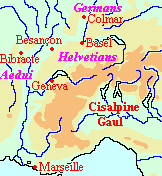
Originally, it was not Caesar's intention to attack Gaul, but Romania, which was rich in precious metals. In the spring of 58 BCE, Caesar's legions were already in the eastern parts of his province: the Seventh, the Eighth, the Ninth and especially the Tenth, which was called 'the knights' and was very dear to Caesar.
However, the migration of the Helvetians, a coalition of tribes in modern Switzerland, forced him to think about at least one or two campaigns in the north. The Helvetians had migrate to the south-west of France and had to cross through Roman territories. This was unacceptable to any Roman governor.
For Caesar, it was a golden opportunity to impress the Senate and People's Assembly. Besides, there were reports about Germans that were attacking the Aedui, a Gallic tribe in the valley of the Saône that was allied to Rome. A victory over the Germans would place him on the same rank as his uncle Marius. This is exactly what happened.
Caesar's military base was the valley of the lower Rhône, which had been Roman from 123 onwards. However, his legions were still in the eastern part of his province. Therefore, in March 58, Caesar destroyed the bridge at Geneva and blocked the road along the Rhône, which served to slow down the Helvetian advance. This action gave Caesar sufficient time to lead his army across the Alps and to recruit two extra legions (Eleven and Twelve). The Helvetians now choose to leave their country in the neighborhood of modern Basel, but when they wanted to cross the Saône in July, Caesar was ready to defeat them, and he defeated them again in August in the neighborhood of the capital of the Aedui, Bibracte.
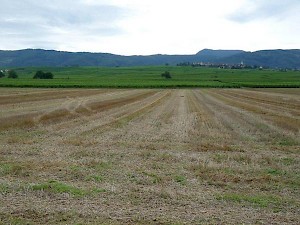
After these victories, some Gauls asked Caesar to help them pushing back the Suebians, a Germanic tribe that had crossed the Rhine and settled in Alsace. Again, Caesar was victorious - the battle took place in September in the neighborhood of modern Colmar - and winter quarters were built near the battle field, in modern Besançon.
Caesar ought to have taken his armies back to the south; letting them stay at Besançon was a deliberate provocation. But Caesar had by now changed his mind: he now set out to conquer all of Gaul. After his successes, it seemed easy. And he was not blind to trade: the Rhône-Saône-Rhine corridor was the most important trade route in pre-industrial Europe, with amber and slaves being among the most important commodities. He could open new markets for the Mediterranean traders; a taste for Roman luxuries had already started in the Gallic states along the Rhône and Saône. British tin was traditionally transported along the rivers Garonne and Seine: an additional bonus.
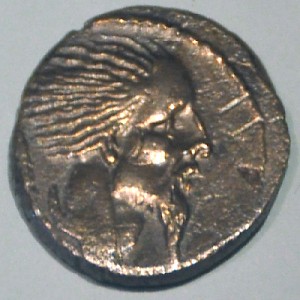
In Caesar's propaganda, this was a preventive war. He spent the winter in Cisalpine Gaul, having an eye on the city of Rome and giving instructions to Piso. And he wrote the first part of his Commentary on the war in Gaul, which had two purposes: he could boast about his successes, and he could explain why he had to attack the rest of Gaul. It was successful: no Roman ever asked if it was really necessary to conquer these vast territories.
The Gallic tribes were aware of the danger. During the winter, the northern tribes, which are usually called Belgians, formed an anti-Roman coalition. This was exactly what Caesar needed: now he had an extra excuse to conquer all states in Gaul.
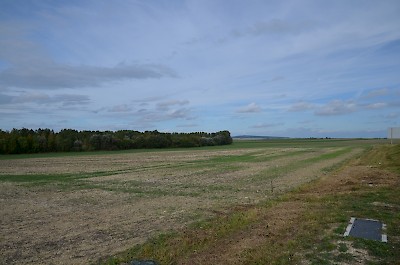
In the spring of 57 BCE, he raised two legions (Thirteen and Fourteen), and together with the other troops, he surprised the Belgian nation of the Remi, who lived in modern Reims. His presence prevented the Remi from taking part in the Belgian attack on the Romans, and as it turned out, they even sided with Caesar. As a result, the other Belgians decided to attack a Remian town that was situated on the boards of the river Aisne. Caesar, however, defeated the coalition.
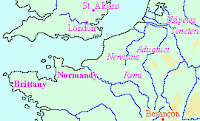
Aftere this, he proceeded along an ancient road to the Belgian Nervians, who lived west of the river Schelde in what is now called Flanders. In the battle of the Sabis, they were annihilated: according to Caesar's exaggerated report, barely 500 of their army of 60,000 survived. Along the Meuse, the Romans inflicted comparable losses upon the Aduatuci; the entire tribe was sold as slaves (go here for Caesar's own version of the story.)
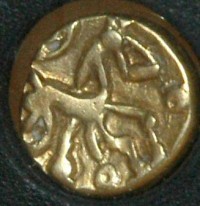
During the same year, a smaller Roman army had gone to the west of modern France and demanded subjection of the nations in Normandy and Brittany. Its commander was Marcus Licinius Crassus, the son of the triumvir.
After his Belgian campaign, Caesar's army went south too; winter quarters were established along the Loire. Meanwhile, in Rome, public thanksgiving lasting fifteen days were decreed by the Senate. No one had been granted this honor before.
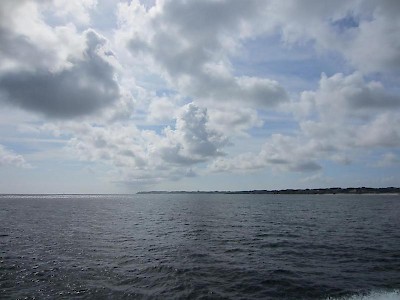
Now that all Gaul had at least nominally submitted to Rome, Caesar spent the winter in Illyricum, but when he had crossed the Alps, the Gauls from Brittany rose against the Romans (56 BCE). Caesar ordered ships to be built, and spent some time in Italy, where he met Pompey and Crassus in Lucca (April 56; text): the triumvirs decided to continue their conspiracy against the Roman republic and agreed that Caesar's generalship in Gaul would be prolonged until 50, December 31. This was an extraordinary command, and Caesar's fellow-conspirators demanded in return Caesar's support to be consuls in the next year, 55. Caesar agreed, and having secured his position, he crossed the Alps and in the summer, in the Bay of Quiberon, a naval battle took place, in which the Bretons were defeated. Caesar's colonels took charge of mopping up expeditions along the coast of the Atlantic Ocean.
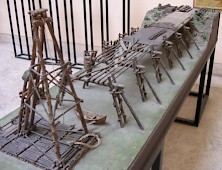
Next year, 55 BCE, Caesar accomplished two feats that must have shaken his Italian audience with excitement. The first action of that year, however, seemed to point in another direction. Two tribes from the area across the Rhine, the Usipetes and the Tencteri, crossed the Rhine and were attacked by the Caesar's troops during an armistice: many women and children were killed. When this genocide became known in Rome, the leader of the conservatives, Cato the Younger, exclaimed that Caesar, the general of eight legions, was to be handed over to the Germans. A very practical suggestion.
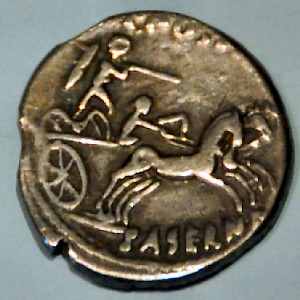
After this incident, Caesar was forced to divert the Senate's attention to other subjects. First, his engineers bridged the Rhine, and the legions crossed into the country across the river, showing the Germans that the Romans were invincible (text). Actually, the destruction of the Germanic towns was little short of terrorism. Having impressed the Germans, the Gauls, and the Senate, Caesar turned to the west, where a large fleet was ready to carry Caesar's armies to Britain, where a short campaign took place. Although the Britons were backward and still retained the primitive social system of chiefdoms (i.e., there were no states), the Senate was duly impressed by the general who had reached the mythological edges of the earth. The consuls in Rome, Crassus and Pompey, were compelled to decree a thanksgiving of twenty days.
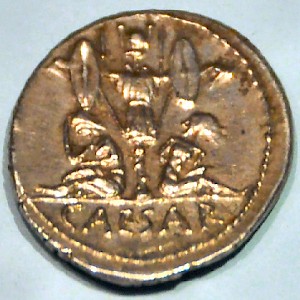
In 54 BCE, Caesar invaded Britain again. He defeated the chief of a British tribe, Cassivellaunus, in a battle near modern London and crossed the Thames. Caesar took a fortress near St. Albans and received tribute. Some scientific experiments were carried out in Essex: from measurements with a water clock, Caesar's explorators learned that the nights in Britain were shorter than on the continent. After this expedition, winter quarters were build among the Belgians.